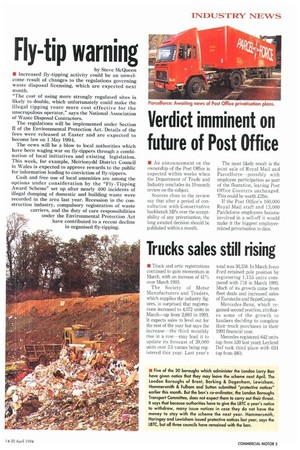Fly-tip warm
Page 9

If you've noticed an error in this article please click here to report it so we can fix it.
by Steve McQueen • Increased fly-tipping activity could be an unwelcome result of changes to the regulations governing waste disposal licensing, which are expected next month.
"The cost of using more strongly regulated sites is likely to double, which unfortunately could make the illegal tipping route more cost effective for the unscrupulous operator," says the National Association of Waste Disposal Contractors.
The regulations will be implemented under Section 11 of the Environmental Protection Act. Details of the fees were released at Easter and are expected to become law on 1 May 1994.
The news will be a blow to local authorities which have been waging war on fly-tippers through a combination of local initiatives and existing legislation. This week, for example, Meirionydd District Council in Wales is expected to approve rewards to the public for information leading to conviction of fly-tippers.
Cash and free use of local amenities are among the options under consideration by the "Fly-Tipping Award Scheme" set up after nearly 400 incidents of illegal dumping of domestic and building waste were recorded in the area last year. Recession in the construction industry, compulsory registration of waste carriers, and the duty of care responsibilities under the Environmental Protection Act have contributed to a recent decline in organised fly-tipping.


























































































